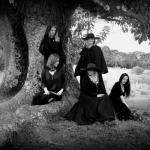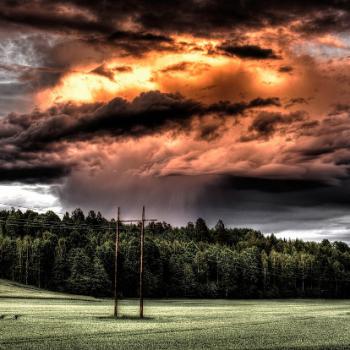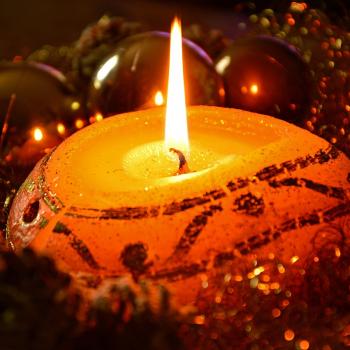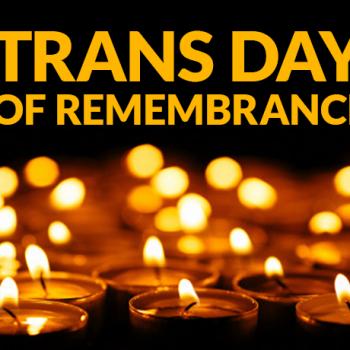
I realize that it’s strange to be blogging at Patheos Pagan and tackle a blog post devoted to picking apart the terms “pagan” and “neo-pagan”, but I actually find it to be a relevant and interesting topic, if not a thorny one.
“Pagan” has long been used to describe any non-Christian or Christian derived faith that is either based off of, influenced by, or directly using ancient faiths and/or containing within it faiths and practices revolving around nature and agriculture. Examples include Hellenism, Religio Romana, Asatru, Celtic reconstructionism, Druidry, and any faith derived from Wicca as it has been published as a non-initiatory faith loosely based off of the initiatory lineages of Wicca (examples include works by Scott Cunningham and Silver Ravenwolf). Pagan religions can be polytheistic, henotheistic, animistic, pantheist, or even have elements of each. Some pagans are even self-described atheists or agnostics and simply honor nature. Some have witchcraft as their self described religion and consider themselves to be pagans as witches. The term “neo-pagan” has been coined to try and separate modern pagan faiths from ancient pagan faiths, which is a thorny topic for those whose practices are at least partially derived from ancient traditions.
If you dive down into any of those links and try to compare all of the different traditions there are a few things which become apparent:
- The term “pagan” is so broad that it’s become more and more difficult to accurately define it.
- “Pagan” has been used so often as being interchangeable with non-initiatory book type Wicca that some people immediately will assume that you are Wiccan if you say that you are pagan.
- We have so much variation in each of these individual paths to the point where there are multiple faiths within a single faith, making the “pagan” identification even more of a simplistic mask that hides a great deal of variance and complication. Hellenism is very much like this, and was like this in antiquity as well.
- “Pagan” vs “neo-pagan” is a meaningless distinction that mostly only reconstructionists and revivalists seem to care about (see point #2) since technically even recon faiths would be neo-pagan since none of us come from a non broken lineage or tradition, but if you want to go die on that hill go right ahead.
I myself typically do not describe myself as a pagan, but as a Greek polytheist or Hellenist instead. It’s a lot easier as far as describing what I do versus relying on an incredibly broad label to define what I am, especially to those who are unfamiliar with faiths other than Christianity. We’re a minority in a sea of a plurality of other minority faiths that can barely find enough in common to have any agreement on anything, and we honestly spend too much time tackling the same, tired topics over and over again (no, we’ve never had a centralized calendar, centralized set of traditions, or centralized texts so please stop asking!) to outsiders to bother with handling the rest.
There are also people who admittedly hate the terms “pagan” and “neo-pagan” because they are tired of being confused with non-initiatory Wiccans, tired of being lumped in with what they consider to be “New Age” philosophies, or tired of the gatekeeping and purity competitions that often happens in these communities if you either aren’t a hard polytheist, don’t deal strictly with just one pantheon, or are involved with either magical and/or mystical pursuits. This is especially prevalent in the reconstructionist communities and is a good chunk of why I now consider myself to be a revivalist versus a reconstructionist. When pagans use reconstructionism to try and compensate for a lack of centralized core set of traditions and practices, it gets ugly pretty quickly. We don’t need centralization in order to be legitimate (it actually delegitimizes us given the historical record), and modern interpretations and reinterpreting of ancient practices needs to be handled with much greater nuance and care than simply copy/paste or blind adherence to only traditions as practiced in Athens in the fifth century.
For outsiders coming in trying to understand the simple question of “What is paganism and how do I become a pagan”, I’m sure that all of this is extremely frustrating to try and learn and understand–especially to those who are used to Christianity, which even with its own branches has essential elements in common to identify themselves as being Christian. Paganism as an umbrella is nowhere near the same thing as Christianity as an umbrella, and the attempt to make comparisons where there are none I’m sure is a natural instinct to those who only know of their experiences and knowledge as a Christian. The learning curve is steep, room for confusion is high, and the potential to rage quit is probably even higher. Even more so given the fact that most people coming in from a Christian background unknowingly use Christianity as their template for how religions function, and then they come into a religion such as Hellenism and find that their world has been turned upside down. If we have no centralized faith or practice in Hellenism (and never did in antiquity either), how do we find anything centralized under the umbrella term of “pagan” or “paganism”? Answer: you don’t, so stop asking, stop looking, save yourselves from the madness and embrace the wild zen of what we all are collectively.
At the same time, those of us who DO come from polytheistic and/or pagan backgrounds need to realize that we have one thing in common: we are religious minorities struggling in a society that is codified, stamped, and molded into Christian mindsets and ideas. For those of us who were lucky enough to not come from Christian backgrounds, it’s a lot easier for us to come in with a blank slate and far less paradigms and expectations that need to be put into the shredder and then burned over a sacrificial flame. And our right to practice and exist varies according to locale and circumstance, and could potentially be threatened at any moment by hateful bigots–and unfortunately some of those bigots are coming from our own religious communities, and we need to guard against this. Regardless of our differences, we should come together and fight for each other because in the end, people won’t know the difference and they won’t care whether or not your faith is based on ancient texts or traditions rooted in the Hermetic Order of the Golden Dawn and other forms of ceremonial magic that came out in the late 19th century. There’s something to be said for embracing our diversity while recognizing that we’re all in that terrible boat together, and we don’t have to pretend to have similarities in order to accomplish that.
We can fight for human rights, the right to practice our faith, to stand against abuse in our communities, to not tolerate intolerance, and can accomplish all that without pretending we’re all the same. And it’s something we may have to do very, very soon given the current climate. We don’t have to agree, and we can sure as hell continue our own individual community in-fighting at the same time we’re doing it–I am a passionate champion of multitasking. So while the terms “pagan” and “neo-pagan” aren’t perfect ones, can frequently be bad or misleading, and on the whole can cause more internet arguments than they resolve, there’s also a bigger picture to consider: we must support and embrace our differences and each other in order for us to survive in this world, and I don’t mind standing under this imperfect and broken umbrella in order to accomplish that.
















